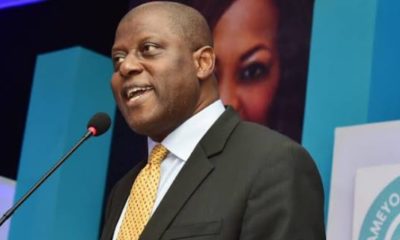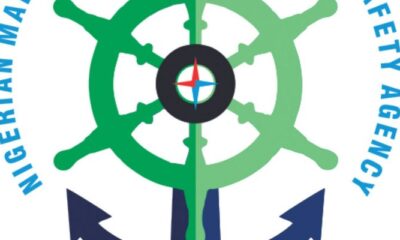Business
Nigerian Lenders Fund Agro-Industry With N4.68tr In 2018-2022

As the Federal Government of Nigeria (FGN) and the government of the 36 states and FCT continue to seek ways out of the current national food crises, a recent report shows that Nigeria’s commercial banks gave N4.68 trillion as loans to the country’s agricultural industry from 2018-2022.
Titled “Commercial Bank Lending to the Nigerian Agricultural Industry 2018-2022,” the report was published by an Abuja-based firm, Alford Conferences Limited, as part of its preparation towards its event called Nigerian Food Surplus Summit.
ALSO READ: Widespread IT Failure Grounds Airlines, Banks, Others
On the report, the Chief Executive Officer of Alford Conferences, Frederick Apeji, stated, “We advocate that Nigeria’s commercial banking sector should seek creative ways to increase the share of its loan portfolio devoted to growing the country’s agricultural industry in the years ahead, beyond the 5.03% that it gave to the industry during the period under review. More importantly, we also advocate that the government of the 36 states and FCT should deliberately work more closely with these commercial banks in order to attract appropriate funding for bankable businesses and projects across the agricultural value chains in their respective domains.
“The total five-year bank lending of N4.68 trillion given to the agricultural industry compares favourably with the N8.18 trillion internally generated revenue (IGR) that was raised collectively in these past five years by the FCT and the 36 states. This IGR figure is tracked annually by Alford Conferences Limited. Another figure worthy of comparison is the N1.12 trillion Anchor Borrowers Fund established by the Central Bank of Nigeria (CBN) in November 2015 to support small holder farmers (SHF) throughout the country.”
The CEO highlighted that the report studied only banks licensed by the Central Bank of Nigeria (CBN) to operate in Nigeria, and those who “had at least N1tr in loans and advances during the period under review (2018-2022)”.
According to Apeji, “We focused on those banks that hold the CBN license to operate either internationally or nationally to produce this report Amongst them (22 in all), we looked at the ones that had at least N1tr in loans and advances during the period under review (2018-2022), irrespective of how much they gave to the Nigerian agricultural industry. The 12 banks thus captured in this report are (in order of the size of their loan portfolio): Access Holdings Plc, Zenith Bank Plc, FBN Holdings Plc, United Bank for Africa Plc, Guaranty Trust Holding Company Plc, Fidelity Bank Plc, Ecobank Nigeria Limited, First City Monument Bank Plc, Stanbic IBTC Holdings Plc, Sterling Financial Holdings Company Plc, Union Bank of Nigeria Plc and Wema Bank Plc.”
Based on the report, Access Holdings was the biggest lender in Nigeria from January 1, 2018-December 31, 2022 (N17.386 trillion) and also the biggest lender to the country’s agricultural industry (N928.55 billion) during this period. Zenith Bank was the 2nd biggest lender in Nigeria (N14.278 trillion), and also the 2nd biggest lender to the country’s agricultural industry (N873.36 billion). FBN Holdings, the 3rd biggest lender in Nigeria with N12.411 trillion, however ranked 7th among the 12 banks in this report based on its total loans of N285.18 billion to the agriculture.
The report further indicated that Ecobank Nigeria gave the highest percentage of its total loans of N4.68 trillion to the agricultural industry. This stood at N574.69 billion, representing 12.28%. Sterling Bank and FCMB Group ranked 2nd and 3rd respectively in terms of their percentage commitment to supporting the Nigerian agricultural industry these past five years. Though small players in the banking industry, they gave 8.19% and 7.58% respectively to agriculture, historically the biggest employer of labour in this country. The three other banks that performed better than the industry average of 5.03% in agricultural lending during this period were Zenith Bank (6.12%), Access Holdings (5.4%) and Stanbic IBTC Holdings Plc (5.33%).
Established in April 2014, Alford Conferences Limited, the convener of the annual Nigeria Food Surplus Summit, is an event production company and a consulting firm that advises the Nigerian and African public sector on subnational revenue generation, agribusiness development, export promotion, strategic investment promotion, host country/host city marketing, pan-African trade, etc.
The forthcoming Nigeria Food Surplus Summit is a nationwide advocacy that seeks to help Nigeria to successfully feed itself and have a large surplus for export by strengthening the commercial farming, food processing, and agricultural machinery segments of the country’s agricultural industry. For decades, up till this present moment, the burden of feeding this country of over 220 million people has rested largely on the shoulders of its millions of smallholder farmers. The summit seeks to strongly complement this by deliberately promoting and boosting commercial farming, food processing, and the production of agricultural machinery on a large scale in each of the 36 states and FCT, partnering actively with their respective ministry of agriculture.
Business
Savannah Energy Provides Unaudited FY 2024 Trading Updates

Savannah Energy has shared a trading update on its Nigerian operations and other markets in Africa, including up-to-date cash collections in its Nigerian business.
According to the update, made available on Thursday in Lagos, its gross production in Nigeria averaged 23.1 Kboepd for FY 2024, broadly in line with the prior year’s 23.6 Kboepd, of which 88% was gas (FY 2023: 91%).
On the update, CEO of Savannah Energy, Andrew Knott, said, “I am pleased to provide a FY trading update which demonstrates the continued progress we have made in 2024, a year which saw the highest level of cash collections ever recorded by our Nigerian business. 2025 is expected to be an exciting year for our Company: we have a large planned operational programme in Nigeria which is anticipated to enhance both our oil and gas production levels and capacity; we intend to progress our R3 East oil development project in Niger; we continue to pursue key acquisitions in the upstream oil and gas space; and we continue to seek to build our power business.
“Fundamentally, Savannah remains unequivocally an “AND” company, seeking to deliver strong performance both for the short AND long term across multiple fronts, and pursuing growth opportunities in both the hydrocarbon AND power sectors.”
The update It also shows that it generated a Total Income of US$393.6 million in 2024, compared to FY 2023’s US$289.8 million. This consists of Total Revenues of US$258.7 million and Other operating income of US$134.9 million.
The report also shows that Savannah’s FY 2024 Total Revenues were ahead of the previously issued financial guidance of greater than US$245 million, while FY 2024 financial guidance is reiterated for Operating expenses plus administrative expenses at ‘up to US$75 million’. The company expects its FY 2024 capital expenditure to come in lower than planned (previously guided at ‘up to US$50 million’) due to the phasing of spend.
ALSO READ: CSR: Dangote Awards Scholarships To 473 Students
According to the update, Savannah’s cash collections in 2024 amounted to US$248.5 million, a slight increase from the US$206 million it received in 2023. The report further shows that its cash balances as at 31 December 2024 stood at US$32.6 million, compared to the 31 December 2023 figure of US$107.0 million.
The report shows that the company’s midstream subsidiary, Accugas Limited, had as at 31 December 2024 drawn down on its NGN332 billion of the NGN Transitional Facility, with the resulting funds being converted to US$, which, along with cash held, was used to partially prepay the existing Accugas US$ Facility, leaving a balance as at 31 December 2024 of approximately US$212.3 million.
The report also provided new updates on Accugas’ US$45 million Uquo Central Processing Facility (“Uquo CPF”) compression project in Nigeria, noting that its commissioning which will enable the expansion of gas production in the medium term is well underway.
The report highlighted the progress being made in the procurement process of long lead equipment in Nigeria for a potential two-well drilling campaign on the Uquo Field in H2 2025, with an additional gas development well expected to add up to 80 MMscfpd of supplemental production capacity and a potential exploration well targeting an Unrisked Gross gas initially in place (“GIIP”) of 154 Bscf (25.7 MMboe) of incremental gas resources.
The update shows that progress is also being made in the planned Savannah acquisition of Sinopec International Petroleum Exploration and Production Company Nigeria Limited, whose principal asset is a 49% non-operated interest in the Stubb Creek oil and gas field (“Stubb Creek”), with regulatory approval and completion being targeted in Q1 2025. Following the completion of the acquisition, Savannah intends to commence an expansion programme which is anticipated to increase Stubb Creek gross production from an average of 2.7 Kbopd in 2024 to approximately 4.7 Kbopd.
In Niger, Savannah continues to seek to progress its 35 MMstb (Gross 2C Resources) R3 East oil development in South-East Niger, while it continues to push for a potential alternative transaction structure to acquire a material stake in producing oil and gas assets in South Sudan as previously announced on 20 December 2024.
On the renewable energy front, the update shows that Savannah has up to 696 MW of renewable energy projects currently in motion, including the up to 250 MW Parc Eolien de la Tarka wind farm project in Niger and the up to 95 MW Bini a Warak hybrid hydroelectric and solar project in Cameroon. A firm believer in Africa’s transition to renewable energy, Savannah continues to target a portfolio of up to 2 GW+ of power projects in motion by the end of 2026.
Business
Nigeria Can Achieve 5.5% GDP Growth – NESG
The Nigerian Economic Summit Group (NESG) has projected that the country has the potential to achieve a 5.5% growth in Gross Domestic Product (GDP) if critical policy reforms are sustained.
This was disclosed on Thursday during the launch of the NESG’s 2025 Macroeconomic Outlook report.
Speaking at the event, the Chief Economist and Director of Research & Development at NESG, Dr. Olusegun Omisakin, highlighted the need for more efficient policy implementation to unlock Nigeria’s economic potential.
READ MORE: Davido Is Richer Than His Billionaire Father – Ibrahim Chatta Claims
“We believe at the optimal level, if we embark on more efficient policy reforms, the Nigerian economy has the potential, the GDP to end up at 5.5 per cent, and we believe that this is achievable,” Omisakin stated.
More to follow……….
Business
CBN Approves Release Of Nigerian FX Code
The Central Bank of Nigeria (CBN) has announced the release of the Nigerian Foreign Exchange (FX) Code, a set of guidelines designed to promote ethical conduct among authorized dealers in the country’s FX market.
In a statement, the apex bank disclosed that the official launch of the Code would take place on Tuesday, January 28, 2025, at the CBN Head Office Auditorium in Abuja.
READ MORE: Dangote Denies Culpability In Pumping Up Petrol Price
“The Central Bank of Nigeria has approved the release of the Nigerian Foreign Exchange (FX) Code as a guideline to the banking industry to promote the ethical conduct of authorised dealers in the Nigerian Foreign Exchange Market,” the statement read.
The introduction of the FX Code is expected to enhance transparency, accountability, and professionalism within Nigeria’s foreign exchange ecosystem, aligning it with global best practices.
The event is anticipated to attract key stakeholders in the financial and banking sectors, as well as representatives from authorized FX-dealing institutions across the country.























